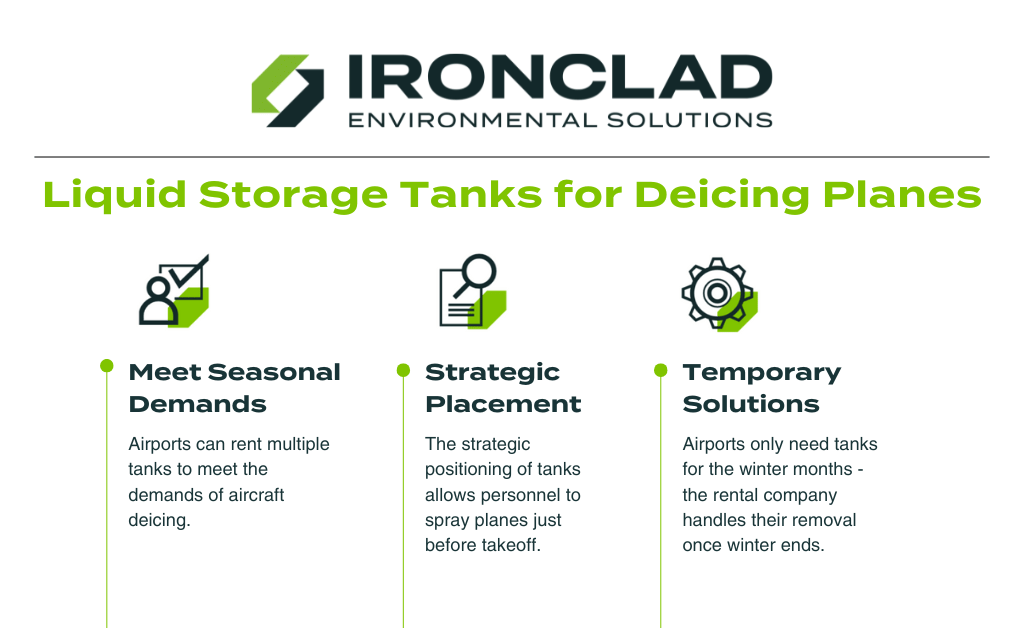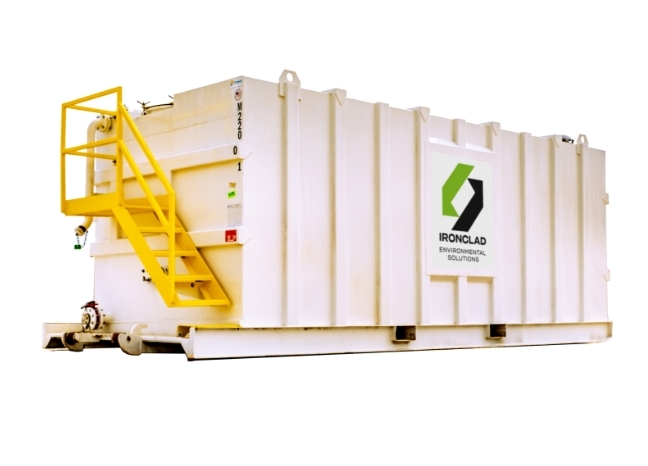How Our Tanks Play a Role in Airplane Deicing in the Winter Season
Aircraft deicing is the process of removing ice and frost from the wings and other surfaces of an aircraft to ensure safe flight operations. It typically involves spraying a heated, glycol-based fluid to prevent ice formation, which can dangerously affect an airplane's aerodynamics and performance.
Ice buildup on wings can disrupt airflow and compromise safety, so airports must have a reliable deicing system in place. Bulk storage tanks play a crucial role by holding large volumes of deicing fluid, allowing for efficient and immediate access when weather conditions require rapid deicing operations.
How Airports Use Glycol-Based Fluids for Deicing Planes
Winter weather presents a significant challenge for the aviation industry, as ice can quickly accumulate on aircraft surfaces and wings. This ice disrupts the smooth flow of air over the wings, impacting lift and control. Deicing procedures are critical to prevent these safety risks and to keep airport operations running smoothly.
Large-scale storage tanks are essential for holding this glycol fluid in bulk, allowing airports to respond immediately when weather conditions like snow or freezing precipitation worsen. By having a well-maintained reserve of glycol-based fluid, flight crews can avoid delays and minimize disruptions during critical travel times.
How Deicing Fluids Work
Deicing fluids are designed to prevent further accumulation on aircraft surfaces. These fluids are primarily composed of propylene glycol or ethylene glycol - substances known for their ability to lower the freezing point of water. When applied, the heated fluid melts existing ice and creates a barrier that delays further ice formation.
Both types of glycol depress the freezing point of water, but they are chosen based on environmental impact and performance needs.
- Propylene Glycol: Considered more environmentally friendly.
- Ethylene Glycol: Effective but must be managed carefully to prevent ecological harm.
These fluids are often mixed with water and heated to improve efficiency and ensure thorough ice removal.
Understanding Holdover Time
Holdover time is a critical aspect of deicing operations. It refers to the duration for which the deicing fluid remains effective in preventing ice from reforming on the aircraft wings. This time can vary significantly based on weather conditions - such as temperature, precipitation type, and wind speed.
The Role of Glycol Concentration
The glycol concentration in the deicing mixture is adjusted to extend holdover time and provide adequate protection. In more severe conditions, a higher concentration of glycol may be used to ensure long-lasting effectiveness.
The fluid must be balanced carefully - too diluted, and it won't provide enough protection; too concentrated, and it can become unnecessarily costly. By fine-tuning this concentration, airports can maintain efficient deicing procedures and keep passengers safe, even in extreme winter weather.
This comprehensive deicing system, supported by large-scale storage tanks and precision in glycol usage, ensures that planes can take off safely and on time, no matter the weather conditions.

Why Liquid Storage Tanks are Essential for Winter Deicing
During peak winter conditions, having easy access to large volumes of deicing fluid is critical. Bulk storage tanks are the backbone of this operation, allowing airports to be fully prepared for unpredictable and inclement weather patterns that can cause rapid ice accumulation on aircraft.
Meeting Seasonal Demands
To manage the heightened demand for deicing fluids, airports can rent multiple large-capacity storage tanks that hold up to 21,000 gallons of fluid. Renting these tanks provides a flexible and cost-effective solution, as airports can quickly adapt to seasonal demands without committing to permanent infrastructure.
For added safety and environmental protection, airports can rent double-wall tanks. The use of spill containment berms also helps prevent leaks or spills, safeguarding the environment from potential contamination.

Rent Double Wall Frac Tanks
Our double wall frac tanks are the solution for bulk liquid and fluid storage.
Strategic Placement for Deicing Operations
Airports use these bulk storage tanks strategically, placing them near critical access points for ground crews. The proximity of these tanks allows personnel to spray planes just before takeoff, reducing wait times and ensuring that planes can depart on schedule.
Temporary Solutions for Seasonal Needs
One of the main benefits of renting liquid storage tanks is their flexibility. Airports only need these tanks for the duration of the winter season. Once the weather warms up and deicing operations are no longer necessary, the rental company handles the removal of the equipment.
This approach allows airport management to focus on their core operations without worrying about long-term storage or equipment maintenance. With temporary rental tanks, airports can effectively manage resources, minimize costs, and streamline the entire deicing process from start to finish.
How Deicing Storage Tanks Support Efficient Operations at Airports
One of the strengths of having reliable deicing storage tanks is the ability to meet the unique fluid requirements of various aircraft types. Smaller aircraft may only need a light application, while large commercial aircraft require significantly more fluid to ensure thorough protection. With our high-capacity tanks, airports can adjust fluid distribution as needed, supporting small and large deicing projects without running short.
Ensuring Compliance with FAA Regulations
Safety and compliance are paramount when handling and storing glycol fluids at airports. The Federal Aviation Administration (FAA) has strict regulations governing the use, storage, and management of these fluids to prevent environmental contamination and ensure safe operations.
Overall, deicing storage tanks are a vital component of airport winter operations, providing the resources and infrastructure needed to keep planes safe, flights on schedule, and airport teams in compliance with regulatory requirements.

Partnering with Ironclad Environmental for Storing Deicing Fluid
When winter weather strikes, airports need immediate storage solutions and a reliable supply of anti-icing and deicing fluid to manage harsh conditions effectively. That’s where Ironclad Environmental comes into play – we can scale quickly with liquid storage assets based on immediate needs. We have steel frac tanks local to many major airports, and we have our own drivers who can deliver equipment 24/7.
Extensive Industry Experience
Our team has a proven track record of providing top-quality storage assets and containment solutions across various industries, from construction and refineries to oil and gas. Our expertise in fluid management ensures that we can handle the challenges of airport operations, especially during the winter months when deicing is critical.
At Ironclad Environmental, we handle everything from the delivery and setup of the tanks to their removal once winter ends - delivering a comprehensive, hassle-free service. Our goal is to simplify the logistics for airport management, allowing them to focus on maintaining safe and efficient flight operations.
Request a Quote Today
Ready to simplify your deicing fluid management this winter? Request a quote for our frac tank rentals to keep your operations running smoothly.
Resources:
- Environmental Protection Agency. https://www.epa.gov/
- Federal Aviation Administration. https://www.faa.gov/